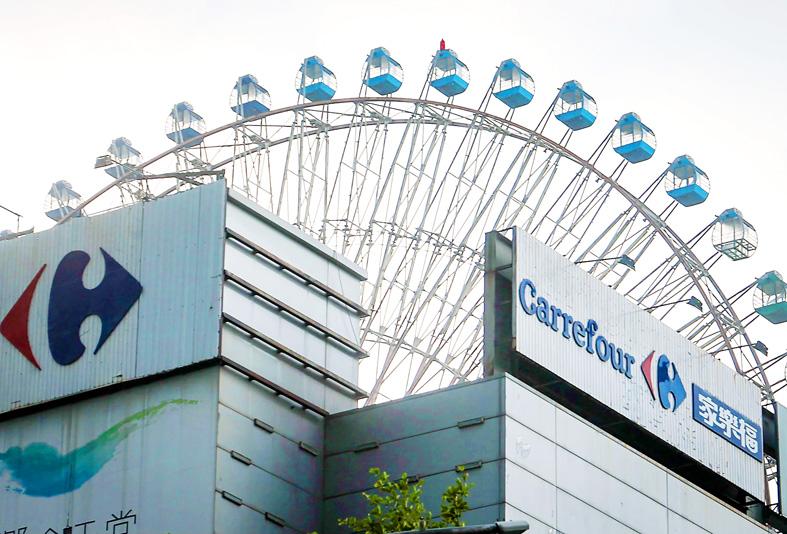Uni-President Group (統一集團) members Uni-President Enterprises Corp (統一企業) and President Chain Store Corp (統一超商) are seeking to take full ownership of Carrefour Taiwan (家樂福) by acquiring the remaining 60 percent stake held by the hypermarket’s French parent company.
At a news conference late on Tuesday, Uni-President Enterprises chief financial officer Chen Kuo-hui (陳國輝) said his company would spend NT$23.9 billion (US$799.4 million) to acquire a 49.5 percent stake in Carrefour Taiwan, while President Chain Store would invest NT$5.1 billion for a 10.5 percent stake, to add to the 40 percent the two companies currently hold.
The NT$29 billion offer would translate into an acquisition price of about NT$65 per share, Uni-President Group said.

Photo: CNA
After the deal, Uni-President Enterprises would hold a 70 percent stake in Carrefour Taiwan, while President Chain Store would own the remaining 30 percent, Chen said.
The two companies would file an application with the Fair Trade Commission for regulatory approval in 15 days, he said.
The transaction is expected to be completed in the middle of next year should the deal gain approval from the commission, which last week conditionally approved an NT$11.5 billion takeover by PX Mart Co (全聯實業) of hypermarket operator RT-Mart International Ltd (大潤發), a rival of Carrefour Taiwan.
Carrefour Taiwan’s 68 hypermarkets, 272 supermarkets and 129 Carrefour-owned stores would then be fully owned by the Uni-President Group, which would also retain the Carrefour brand rights in Taiwan.
In addition, the Taiwanese conglomerate would gain full rights to the property assets — logistics centers and some hypermarket stores — currently owned by the joint venture.
Uni-President Group is the largest convenience store operator in Taiwan through ownership of 6,503 7-Eleven outlets, and also runs Cosmed (康是美) health and beauty stores and Uni-Ustyle department stores (統一時代百貨) in the country.
Local data showed that revenue generated by the local hypermarket industry totaled NT$228.7 billion in 2020, with Costco Wholesale Taiwan Ltd (台灣好市多) holding a leading 42.8 percent share of the market, ahead of Carrefour Taiwan’s 32.3 percent, RT-Mart’s 11.7 percent and Far Eastern A-Mart Co’s (遠東愛買) 4.6 percent.
The acquisition is expected to help Uni-President Group cement its lead in Taiwan’s retail industry, said Wu Shih-hao (吳師豪), a professor at National Kaohsiung University of Science and Technology’s marketing and distribution department.
It would give the conglomerate a comprehensive retail network in Taiwan with holdings in several distribution channels, Wu said.
Add this to its existing virtual distribution network, the conglomerate is all set to meet demand from a wide range of customers, he said.
After the transaction, France’s Carrefour SA is to withdraw from Taiwan’s retail market as part of its move to exit the Asian market.

In Italy’s storied gold-making hubs, jewelers are reworking their designs to trim gold content as they race to blunt the effect of record prices and appeal to shoppers watching their budgets. Gold prices hit a record high on Thursday, surging near US$5,600 an ounce, more than double a year ago as geopolitical concerns and jitters over trade pushed investors toward the safe-haven asset. The rally is putting undue pressure on small artisans as they face mounting demands from customers, including international brands, to produce cheaper items, from signature pieces to wedding rings, according to interviews with four independent jewelers in Italy’s main

Japanese Prime Minister Sanae Takaichi has talked up the benefits of a weaker yen in a campaign speech, adopting a tone at odds with her finance ministry, which has refused to rule out any options to counter excessive foreign exchange volatility. Takaichi later softened her stance, saying she did not have a preference for the yen’s direction. “People say the weak yen is bad right now, but for export industries, it’s a major opportunity,” Takaichi said on Saturday at a rally for Liberal Democratic Party candidate Daishiro Yamagiwa in Kanagawa Prefecture ahead of a snap election on Sunday. “Whether it’s selling food or

CONCERNS: Tech companies investing in AI businesses that purchase their products have raised questions among investors that they are artificially propping up demand Nvidia Corp chief executive officer Jensen Huang (黃仁勳) on Saturday said that the company would be participating in OpenAI’s latest funding round, describing it as potentially “the largest investment we’ve ever made.” “We will invest a great deal of money,” Huang told reporters while visiting Taipei. “I believe in OpenAI. The work that they do is incredible. They’re one of the most consequential companies of our time.” Huang did not say exactly how much Nvidia might contribute, but described the investment as “huge.” “Let Sam announce how much he’s going to raise — it’s for him to decide,” Huang said, referring to OpenAI

The global server market is expected to grow 12.8 percent annually this year, with artificial intelligence (AI) servers projected to account for 16.5 percent, driven by continued investment in AI infrastructure by major cloud service providers (CSPs), market researcher TrendForce Corp (集邦科技) said yesterday. Global AI server shipments this year are expected to increase 28 percent year-on-year to more than 2.7 million units, driven by sustained demand from CSPs and government sovereign cloud projects, TrendForce analyst Frank Kung (龔明德) told the Taipei Times. Demand for GPU-based AI servers, including Nvidia Corp’s GB and Vera Rubin rack systems, is expected to remain high,